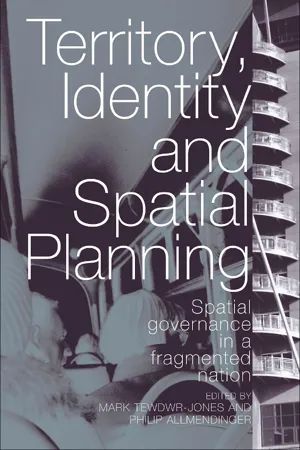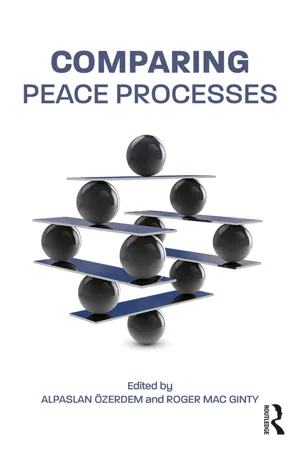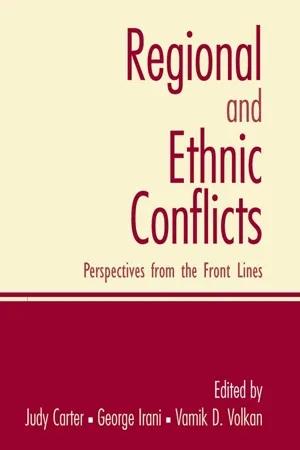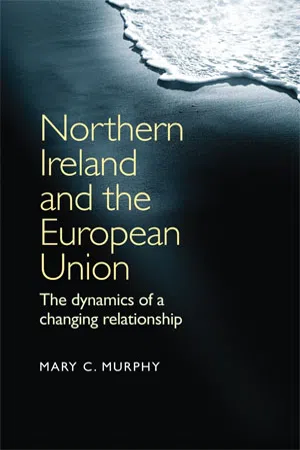Politics & International Relations
The Northern Ireland Assembly
The Northern Ireland Assembly is the devolved legislature for Northern Ireland, with powers over areas such as education, health, and justice. It was established as part of the Good Friday Agreement in 1998 and plays a key role in the governance of Northern Ireland. The Assembly is made up of 90 Members of the Legislative Assembly (MLAs) who are elected by the public.
Written by Perlego with AI-assistance
Related key terms
7 Key excerpts on "The Northern Ireland Assembly"
- eBook - ePub
Territory, Identity and Spatial Planning
Spatial Governance in a Fragmented Nation
- Mark Tewdwr-Jones, Philip Allmendinger(Authors)
- 2006(Publication Date)
- Routledge(Publisher)
The Agreement, 1998). This was something of a tall order given the regularity with which Northern Ireland’s politicians mined history (real and imagined) in pursuit of modern political agendas. History augured poorly for contemporary attitudes to the newly devolved version of The Northern Ireland Assembly.Space does not permit a full catalogue of the trials of the infant years of the new powersharing Assembly, but a brief sketch is required before outlining public attitudes to the institution. The key problem lay in the chronic mistrust between nationalists and republicans on the one hand and unionists and loyalists on the other. The Belfast Agreement had attempted to put to one side their essential conflict (a clash of incompatible nationalisms) and hoped that the Assembly and its companion institutions and mechanisms would provide avenues for harmonious day-to-day inter-group cooperation and the management of grievances. But the nationalist and unionist constitutional projects continued to pollute an Assembly that was only mandated to look after local governance matters. ‘Outbidding’ from intra-group competition (Sinn Féin versus the Social Democratic and Labour Party, and the Democratic Unionists versus the Ulster Unionists) meant that there was little space for centre ground accommodation. The contested interpretation and implementation of the Belfast Agreement, especially with regard to the decommissioning of republican arms stocks, provided an unpromising terrain for the new powersharing administration.Although elections for the Assembly were held in June 1998, nationalist versus unionist wrangling meant that the Assembly did not meet and its power-sharing Executive was not nominated until November 1999. Disagreement over the decommissioning of republican arms led to the first suspension of the Assembly between February and May 2000. The Assembly was again suspended in August 2001, for 24 hours, and between September and November 2001. The fourth, and longest lasting, suspension came in October 2002 following allegations that the IRA was using the Assembly as a base for spying. Since then, little of substance has occurred. Elections to the moribund Assembly were held in November 2003 and saw Sinn Féin and the DUP make large gains (later confirmed by the May 2005 general election). The DUP rejects the ‘forlorn hope that Sinn Féin can eventually be sanitised’ and proposes a ‘voluntary coalition’ to form a devolved government (DUP, 2005). This contradicts the principle of inclusion that underpinned the peace process and would require a major policy shift from the nationalist SDLP if the voluntary coalition was to have a cross-community dimension. British and Irish government attempts to broker nationalist–unionist deals have foundered amid further claims of republican involvement in violence and unionist dissatisfaction with the Belfast Agreement. - eBook - ePub
- Alpaslan Özerdem, Roger Mac Ginty(Authors)
- 2019(Publication Date)
- Routledge(Publisher)
It also introduced a large number of reforms that would mean changes in policing and the expression of identity. The Agreement followed three strands. Strand one involved the establishment of a power-sharing Assembly in Northern Ireland. A complicated electoral formula meant that both Catholic-nationalists and Protestant-unionists would jointly form a government. Strand two involved North–South relations and established a North–South Ministerial Council whereby The Northern Ireland Assembly and the Parliament of the Republic of Ireland would have regular meeting to discuss issues of common concern, such as waterways or sharing energy or healthcare provision. Strand three involved the East–West dimension and established a Council of the Isles in which representatives from London and Dublin, as well as from the devolved institutions in Scotland, Wales, and Northern Ireland could come together to discuss common concerns. The Agreement reaffirmed Northern Ireland’s constitutional position within the United Kingdom, and that any change to that position would have to be through consent. It pledged to hold a constitutional referendum if there was a mood for change. The Irish government withdrew the clauses in its constitution that staked a claim over the territory of Northern Ireland. The Agreement recognised that people in Northern Ireland could have Irish citizenship, British citizenship, or both. There was provision for the ‘normalisation’ of security, such as the removal of security installations, for major reforms to the policing and justice sectors, and for the introduction of human rights and equality legislation. Militant prisoners were to be released from prison (a proposal that many of the families of victims of violence disagreed with) - Mark Garnett(Author)
- 2020(Publication Date)
- Routledge(Publisher)
20 A Compact Civic Advisory Panel will oversee structured engagement with civic society, with at least one citizens’ assembly to be held each year to produce recommendations to the Executive. In late 2018 a pilot citizens’ assembly on social care demonstrated the potential for ordinary citizens in Northern Ireland to become informed on a complex issue, to engage in respectful deliberation with one another, and to produce recommendations oriented towards the common good over narrow interests (Pow and Garry, 2019). If the Executive treats these new formally instituted bodies as meaningful tools of civic engagement, and if the deliberation that takes place among participants displays an accommodatory spirit that has often eluded political elites, they have the potential to play a deeper role in helping to connect the activity of Northern Ireland’s consociational institutions to the wider public.The (return of the) constitutional question
Part of the apparent intractability of ethnic conflict in Northern Ireland was that it went beyond religious divisions between Catholics and Protestants. These group divisions were – and remain – compounded by questions of national sovereignty and self-determination. Arend Lijphart, a leading consociational theorist, argued that one of the conditions conducive to consociational democracy – a sufficient degree of national solidarity across groups – was absent in this case. Rather, he argued, ‘national solidarities deepen the cleavages of Northern Ireland, because the Catholics tend to feel allegiance to the Republic (of Ireland) whereas the Protestants are loyal to the British Crown’ (Lijphart, 1975: 100).The Good Friday Agreement did not resolve the constitutional question; an attempt definitively to settle the issue would have precluded any agreement from emerging. Instead, it placed the constitutional question in a broader context, emphasising positive-sum relationships ‘within Northern Ireland, between (the) North and South (of Ireland), and between these islands (Ireland, Great Britain, and British crown dependencies)’, rather than emphasising territorial matters through a zero-sum lens. However, the text is not ambiguous on Northern Ireland’s place in the United Kingdom, at least for the short- to medium-term:- eBook - ePub
Regional and Ethnic Conflicts
Perspectives from the Front Lines, CourseSmart eTextbook
- Judy Carter, George Irani, Vamik D Volkan(Authors)
- 2015(Publication Date)
- Routledge(Publisher)
In 1998, after decades of violence and unsuccessful reconciliation attempts, a peace settlement was reached. It was known as the Good Friday Agreement and was signed by Northern Ireland and the British and Irish governments and is now being implemented. The Good Friday agreement gave the province political autonomy under an elected assembly with proportional representation for the Catholic minority and Protestant majority. The assembly will guarantee power sharing between the communities.In his essay “The Politics of Peace and War in Northern Ireland,” Sean Byrne tries to capture the brittleness of the process of peace signed in Northern Ireland in 1998. He explains initially the multiple causes at the origin of the conflict by exploring the historical, religious, demographic, psychocultural, economic, and political context of that time. He centers on the phenomenon of identity allegiances of the Protestants and the Catholics, fueled with the fear of seeing their political power, economic interests, and religious freedom threatened by the opposing community. Byrne also studies the impact of past traumas, often marked by a skewed perception of the “other,” which maintains mistrust between the various actors of the two communities: “Identity-based group conflict is at the very heart of the Northern Ireland conflict.” Then the author examines the mitigated results of a series of political initiatives launched by the United States and the European Union and the British and Irish governments to solve the conflict and to support social reconciliation, before coming to an analysis of the agreements signed for disarmament by the IRA in 1998, which claimed to guarantee the pacification of the situation in Northern Ireland. The author evaluates different prospects of pacification and mentions the challenges of sociopolicies, when attempting to address the question fully. - eBook - ePub
Northern Ireland and the European Union
The dynamics of a changing relationship
- Mary C. Murphy(Author)
- 2016(Publication Date)
- Manchester University Press(Publisher)
l Paragraph 28 of ‘A Framework for Accountable Government in Northern Ireland’ is devoted to ‘relationships with the European Union’. Specifically, it suggests that any new institutions created in Northern Ireland would have responsibility for implementing EC legislation and programmes. In addition, any new structures would be charged with ‘developing Northern Ireland’s views on EU issues and representing them to the UK government and in any new North/South institutions’. These provisions are again repeated, in greater detail, in paragraph 26 of ‘A New Framework for Agreement’.Northern Ireland, however, represents a different case-study. The achievement of devolution there involved a different rationale from that in Scotland and Wales. Moves towards devolution in the region were designed primarily as a means to allow the region to escape the violence and intercommunal ethno-national conflict that has troubled it since the late 1960s and also to return democratic and accountable government after almost three decades of direct rule. Most commentators agree that: ‘the principal aim of the Agreement has been to secure peace’ (Cadogan Group 1998 : 23), and although the outcome has been a form of devolution, this was not necessarily given when the peace process was initiated. The novel nature of the agreed devolved system, as detailed in the 1998 Belfast Agreement, is a direct response to the conflict and not the result of any other circumstances.The political predisposition of successive Irish and UK governments and local political actors towards some form of devolution as a viable means of alleviating or overcoming the Northern Ireland conflict is interesting. The difficulties in relation to the previous attempt at devolution (during the period 1921–72) might suggest some aversion to revisiting the same constitutional option. According to Maguire (1992 - eBook - ePub
Northern Ireland a generation after Good Friday
Lost futures and new horizons in the 'long peace'
- Colin Coulter, Niall Gilmartin, Katy Hayward, Peter Shirlow(Authors)
- 2021(Publication Date)
- Manchester University Press(Publisher)
96 who forged a formidable partnership with his Dublin counterpart, Tanáiste Simon Coveney. In the weeks either side of Christmas 2019, the pair would exploit the weakened hand of Northern Ireland’s two largest political parties with no little skill. During the talks, both Sinn Féin and the DUP were reminded that in the absence of a new political deal there would have to be Assembly elections that would almost certainly see the parties suffer yet further losses. Smith and Coveney further sought to concentrate the minds of Northern Ireland’s notoriously intransigent politicians when they took the bold step of making public the terms of a potential new agreement and demanding that the parties sign up to them. In a memorably adroit move, the Tánaiste and Secretary of State hosted a press conference to reiterate this demand just before 10pm on Thursday 9 January 2020 with a suitably vacant Stormont parliament buildings as a backdrop. Mindful of the darkening public mood caused by the ongoing political stalemate, all of the major local parties would declare their support for Northern Ireland’s latest political deal within the next twenty-four hours. Their swift compliance ensured that on Saturday 11 January 2020 the first full meeting of The Northern Ireland Assembly in more than three years took place in an atmosphere so apparently harmonious that the casual onlooker might reasonably have wondered how its record breaking suspension had occurred in the first place.The political settlement that allowed the Stormont institutions to resume working would, not for the first time, promise a fresh start in Northern Irish political life. In the course of its sixty-two pages, the document with the optimistic title New Decade, New Approach covers an almost bewildering diversity of topics. The prospective programme for government, for instance, identifies targets as many and varied as ‘removing paramilitarism, ending sectarianism, transforming health and social care, reforming education, ensuring households have access to good quality, affordable and sustainable homes, addressing climate change, creating good jobs and protecting workers’ rights’. While the new political deal touches on a great diversity of topics, there are really two principal issues that form its core. First, the text of New Decade, New Approach sets out to address the deeply dysfunctional mode of conduct associated with the previous coalition government that came to light during investigations into the RHI scandal. With a view to ‘rebuilding the trust of citizens’ there will be a new way of doing things marked by ‘greater transparency and improved governance’. In more specific terms, there will be proper record-keeping, details of ministers’ meetings will be published, and measures to prevent bullying and protect whistle-blowers will be introduced. Acknowledging the abuses of power that characterised the previous incarnation of the Stormont parliament, the new agreement pledges to install a code of conduct for special advisers and to ensure that the controversial ‘petition of concern’ will in future be used ‘only in the most exceptional circumstances and as a last resort - eBook - ePub
Northern Ireland
Conflict and Change
- Jonathan Tonge(Author)
- 2013(Publication Date)
- Routledge(Publisher)
The European Union may be able to promote a certain range of cross-border initiatives based on mutual co-operation, but the project may be limited. Transfers of identity towards Europe assume the existence of a spillover effect, in which economic cross-border initiatives prove to be the catalyst for new institutions and new loyalties. People in Northern Ireland and the Republic may support the promotion of economic co-operation within the European Union, but equally may desire that this is ‘ringfenced’ co-operation, restricted to that sphere. The political transfer of loyalties is another matter. As Porter (1996: 39) puts it: ‘… sovereignty is not so easily disposed of, borders are not so magically spirited away and political identities are not so effortlessly relocated’.Unionists would have more to lose by the pooling of sovereignty over Northern Ireland. British sovereignty is actual; the Republic’s is no longer even claimed. Furthermore, as with joint British-Irish authority, the mechanics would be difficult. A British police force would probably remain, as might nominal British sovereignty, even if real legislative power lay with Europe. Northern Ireland would probably remain a region under nominal British jurisdiction within a Europe of the Regions.15.2.6 Devolved power-sharing without cross-border bodies
15.2.6.1 Definition
Devolution to a Northern Ireland Assembly would take place as now, but without the all-Ireland dimension of the Good Friday Agreement. Devolution without cross-border bodies continues to receive overwhelming support within the Democratic Unionist Party. It is also the favoured solution of nearly half of the Ulster Unionist Council (Tonge and Evans, 2001a).15.2.6.2 Advantages
Consociational arrangements, basically involving the sharing of power amongst élites, have worked elsewhere in divided societies, particularly bi-communal ones such as Northern Ireland. Unionist critics of the Good Friday Agreement argue that it is impossible to develop Nationalist loyalty to Northern Ireland when the role of the Irish government is enhanced through cross-border bodies. Such critics believe that the most appropriate means of developing loyalty to the state of Northern Ireland is to discourage this external reference point for Northern Nationalists. From the 1960s onwards, Nationalists realised that simple anti-partitionist politics are inadequate. Sharing power strictly within Northern Ireland provides them with a stake in the state, but cross-borderism concurrently undermines that state.
Learn about this page
Index pages curate the most relevant extracts from our library of academic textbooks. They’ve been created using an in-house natural language model (NLM), each adding context and meaning to key research topics.






